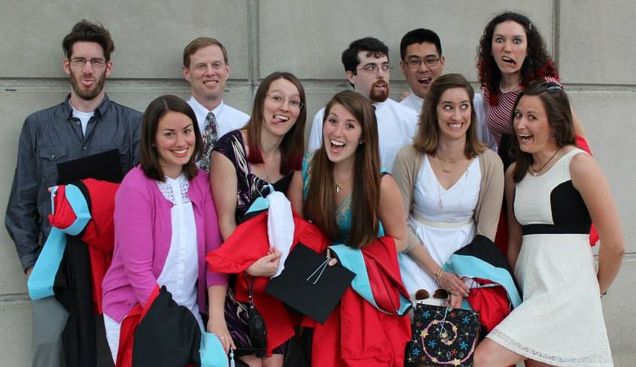Scholar Profiles
Project PSUNS Cohort 6 (2018-2019)
Andrew Amodei — Chemistry
 Andrew is a native of the Pacific Northwest, where he grew up enjoying snowy mountains, evergreen forests, and orcas. He loves hiking alpine trails, watching Disney movies, and reading historical fiction. He’s recently picked up a new hobby; he’s joined the amateur radio community and is earning his technician license. A chemical engineer career changer, he is looking forward to pivoting into science education. His goal is to encourage and inspire high school students to become America’s next generation of builders and innovators.
Andrew is a native of the Pacific Northwest, where he grew up enjoying snowy mountains, evergreen forests, and orcas. He loves hiking alpine trails, watching Disney movies, and reading historical fiction. He’s recently picked up a new hobby; he’s joined the amateur radio community and is earning his technician license. A chemical engineer career changer, he is looking forward to pivoting into science education. His goal is to encourage and inspire high school students to become America’s next generation of builders and innovators.
“Watching Star Trek from a young age facilitated my interest in all things science, and I was partly inspired by LeVar Burton playing chief engineer Geordi La Forge on the Enterprise. I also found myself enjoying topics in chemistry and medicine during high school. Between my interest in medicine and my at-home experience helping my dad perform car repairs, I somehow landed on chemical engineering as a college major. It was the right blend of science and engineering. After taking my first coding class in Java, I realized there were lots of opportunities in the increasingly overlapping spheres of science, engineering, and technology. I wanted to be at least one component of this fast-growing and high-demand field.”
“After graduating from the University of Washington, I spent a few years working as an engineer in specialty chemicals, polymers, and even the oilfield. But an economic twist found me searching for new work, and I ended up moving to China to become an English language teacher in Shanghai. This exposure to teaching eventually led me back to the United States so that I could earn the proper credentials to become a licensed high school chemistry teacher. I intend to use my prior experience in the engineering field and my new role as a chemistry teacher to mentor and encourage students to pursue their STEM dreams.”
Casey Flynn — Physics
 Casey grew up in Connecticut before moving to Boston to begin her undergraduate career at Boston University where she pursued Physics and Astronomy. She enjoys watching movies, cooking, baking, and making friends laugh!
Casey grew up in Connecticut before moving to Boston to begin her undergraduate career at Boston University where she pursued Physics and Astronomy. She enjoys watching movies, cooking, baking, and making friends laugh!
“I was blessed with great science teachers in high school. In my undergraduate career I was able to conduct research on the MAVEN experiment and at CERN which only furthered my love and appreciation of scientific research.”
“I’ve always been interested in teaching due to the few highly engaging teachers I had in my own high school experience. The BU Noyce Program was preferred because of the opportunity it would afford me to work with students who may not have had the same chances I had.”
Scott Frank (Project BoNUSS) — Biology
 Scott is the proud father of two young children. He loves music (jazz, blues, latin, country, anything good really). For example, his son recently introduced him to The White Stripes, which is is now a regular fixture on his playlists. He is also an amateur piano and accordion player. Together with his son on guitar, and daughter on percussionist (think a cherubic Sheila E), they have established a small family band. He was raised in California and as a result love big trees, big mountains and big skies. Some of his fondest college memories are of time spent backpacking with his best friend. As a result, he is anxiously awaiting the day when he can introduce his children to backpacking in the Sierras (Emigrant Wilderness is my favorite spot).
Scott is the proud father of two young children. He loves music (jazz, blues, latin, country, anything good really). For example, his son recently introduced him to The White Stripes, which is is now a regular fixture on his playlists. He is also an amateur piano and accordion player. Together with his son on guitar, and daughter on percussionist (think a cherubic Sheila E), they have established a small family band. He was raised in California and as a result love big trees, big mountains and big skies. Some of his fondest college memories are of time spent backpacking with his best friend. As a result, he is anxiously awaiting the day when he can introduce his children to backpacking in the Sierras (Emigrant Wilderness is my favorite spot).
My interest in science can be directly linked to a number of life-changing teachers. First, was my high-school biology teacher, who unearthed a passion for biological sciences that I did not know I had. Her excellent teaching also gave me the confidence to pursue a career in science. I had no doubt I would succeed. I also had several very influential teaching assistants at UC Berkeley, who opened my eyes to the joys of basic research and encouraged me to go to graduate school. I have never looked back. My scientific career has provided me some of my life’s greatest pleasures.
I have always wanted to spread the gospel of biology, medicine, and basic research. Until you’ve conducted a successful experiment you haven’t lived!! As a result, I pursued numerous opportunities to teach at the college level. However, overtime I recognized that my teaching was no match for my enthusiasm and passion. As my educational experiences had been predominantly of the “sage on a stage” variety, I had a difficult time breaking out of this mold in my own classroom. I pursued a degree in science education with the hopes that I could transform my classroom into one where discourse and engagement would take center stage. BU’s degree program exceeded my expectations. While I still have a long way to go in making my classroom live up to my egalitarian ideal (something that I will likely never attain), BU provided me with the confidence and knowledge to pursue this dream.
Joann Kim — Chemistry
 Joann was born and raised in southern California, but since graduating college at UC San Diego, she has lived in Boston where she can finally experience all four seasons! She is an avid reader–particularly interested in science fiction and psychology. She loves taking scenic hikes, crafts, and of course, teaching science! She’s worked with young infants as well as college students and even adult learners.
Joann was born and raised in southern California, but since graduating college at UC San Diego, she has lived in Boston where she can finally experience all four seasons! She is an avid reader–particularly interested in science fiction and psychology. She loves taking scenic hikes, crafts, and of course, teaching science! She’s worked with young infants as well as college students and even adult learners.
“While briefly attending a post-baccalaureate program in the sciences as a career-changer, I began teaching as a TA for the chemistry department at Harvard College and Wellesley College. From developing curricula to managing teaching staff, I was able to learn how to teach chemistry at all levels. I gained so much knowledge by working under passionate professors, teaching Harvard Summer School high school students as well as adult extension students. This led me to pursue licensure to revitalize my high school chemistry curriculum and work on building foundations for students, hopefully to inspire them to gain the confidence to pursue science in college. Chemistry is an often misunderstood and overlooked subject that can be made accessible for any willing student. My goal is to encourage and fully prepare my high school students for future science studies.”
“The Noyce Program gave me the opportunity to learn about education theory, introduced the NGSS approach to teaching science through active learning, and connected me to an amazing teaching culture. The smaller cohort in the program was a great opportunity to work with like-minded educators, and it was enlightening and humbling to learn beside so many passionate colleagues. BU SED also gave us the practical experience of student teaching in a high-need school to prepare us in our pursuit to make a real difference in our students’ communities and lives.”–
Project PSUNS Cohort 5 (2017-2018)
Chris Alba — Physics
Chris is a self-described “rare athletic nerd.” He loves judo, ice skating, swimming, volleyball, and all things related to physics and learning.
“When I started taking physics in high school, I found it hard to not continue because it stirred my curiosity and allowed me to see the world in a novel way. And so, I kept going and going and now I want to share my perspective and what I’ve learned with others.”
“I think it’s important to not only know the science we teach, but how we can best teach it and and I believe that a degree in science education will help me learn how to best teach what I know.”
Britt Briber — Physics
Britt is an avid backpacker and is looking forward to hiking the Pacific Coast Trail at some near point in the future.
“I love to learn about how the physical world works!”
“I enjoy teaching young adults science and engaging them in discussion about contemporary environmental problems that rely on science theory. Teaching allows me to do both of these things.”
Lisa Carey — Middle School Science
Lisa grew up right outside of Boston in Quincy, MA. She earned a B.A. in Psychology from Saint Anselm College in Manchester, New Hampshire in 2015. After graduating from college, she decided to join AmeriCorps City Year program for two years in Manchester. The decision to do City Year changed the trajectory of her life and brought her here to BU to work on her MAT. In her free time she loves to cheer on my favorite baseball team, the Red Sox, spend quality time with my friends and family, and exploring new areas.
“Ever since 6th grade, when I began having regular science classes, science has always been my favorite class all the way up until college. I’ve always loved science and I love having the change to discuss different phenomena with student and getting the chance to ‘blow their minds’.”
“From my experience with City Year, I knew that I wanted to work with students in a high needs, urban area. When I came across the BU Noyce Program, I felt like I hit the jackpot. This was the exact program that I was looking for in order to further my teaching education specifically in science and in a high needs, urban area.”
Laura Losmozos — Middle School Science
 Laura enjoys walking around in nature, being silly, and connecting with others. They grew up in the Dominican Republic and studied geology and education at the University of California, Davis. After working in various research labs and in environmental education, Laura decided to pursue a career in encouraging young people to develop into their greatest (and most scientifically curious) selves.
Laura enjoys walking around in nature, being silly, and connecting with others. They grew up in the Dominican Republic and studied geology and education at the University of California, Davis. After working in various research labs and in environmental education, Laura decided to pursue a career in encouraging young people to develop into their greatest (and most scientifically curious) selves.
“My interest in science stemmed from the love and curiosity I felt towards nature. Not only did I want to learn more about the natural environment, but I also wanted to figure out my role in protecting it. This led to me to major in geology and work in various research labs.”
“After working with young people in outdoor, makerspace, and garden education programs, I decided that science teaching was the field where I could merge my interests and make a positive impact on the lives of others. I’ve also had some very influential teachers who continually inspire me to learn and grow. I knew I wanted to teach in a high needs school, so the Noyce program at BU seemed like a perfect blend of resources for the next step in my career path. I really appreciated the program’s focus on understanding the failures of our educational system and how to create more socially just classrooms.”
Rebecca Siegal — Middle School Science
Rebecca went to Hampshire College where she studied geology. She enjoys sea kayaking and birding. While birding here in the NE, she gets to see one of her favorite birds in Massachusetts, the double-crested cormorant. She is also very interested in organic farming and have worked on several organic farms during her life.
“I taught environmental education in Alaska. This entailed teaching a lot of coastal and forest ecology. My favorite thing to do was to take kids ‘tide pooling.’ My favorite intertidal creatures to find are clam worms, giant pacific octopus, and brachiopods. Along with my extensive time in the outdoor world, I love sharing what I’ve learned with those who haven’t explored it as much as I have.”
“I wanted to go to BU because my favorite science teacher earned her teaching degree at BU. It seemed like a good choice.”
Project BoNUSS Cohort 4 (2016–17)

Cohort 4 hanging out in our BU Science Lounge area.
Kristina Capuzzi — Physics
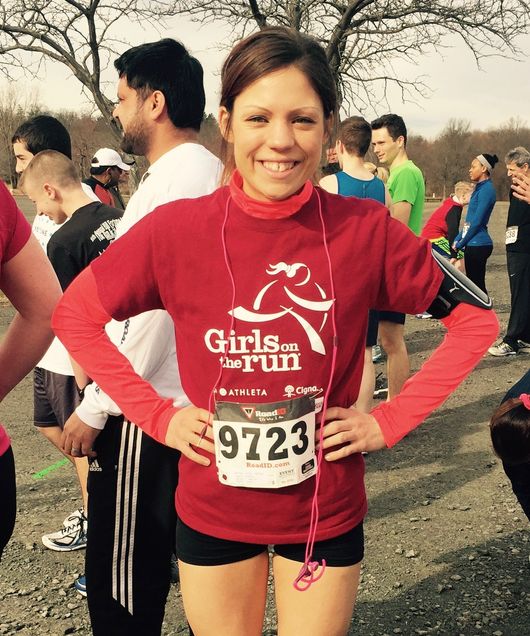 Kristina was born and raised in the beautiful Hudson Valley, New York. She began her undergraduate career as an undeclared major and ultimately gave in to pursuing a Bachelor’s degree in physics. Kristina graduated from SUNY New Paltz in 2014 where she spent a lot of time tutoring students in algebra, physics, the physics of sound & music and hearing science. As a senior, she helped build a laser lab to conduct research and experiments within the realm of laser tweezing. After a year or so interning with Disney World, she came back North and only needed one visit to Massachusetts to fall in love with Boston.
Kristina was born and raised in the beautiful Hudson Valley, New York. She began her undergraduate career as an undeclared major and ultimately gave in to pursuing a Bachelor’s degree in physics. Kristina graduated from SUNY New Paltz in 2014 where she spent a lot of time tutoring students in algebra, physics, the physics of sound & music and hearing science. As a senior, she helped build a laser lab to conduct research and experiments within the realm of laser tweezing. After a year or so interning with Disney World, she came back North and only needed one visit to Massachusetts to fall in love with Boston.
“I spent my childhood collecting both Barbies and Hot-Wheels. I was fascinated with understanding how and why things in the world work and I knew that science was my favorite subject in school. As a high school senior, I opted to take physics with the best teacher I could have asked for. He amazed me each and every day with a scientific demonstration of what we were going to learn about next. I may have surprised him as well, as he continually graded a possibly-familiar-with-detention cheerleader’s straight As. I became inspired learn more and more science. I continue to be so curious with the world we live in, seeing physics as the beautiful science that explains it all.”
“I went to two small state schools in New York, which I loved; the size and being close to home. I couldn’t wait to start graduate school, yet took time to contemplate where and what program was right for me. After visiting my best friend that had moved to Boston, I grew hungry to be a part of BU. It was so big and inviting and offered such great learning opportunities. The Noyce scholarship called my name since I love working to inspire students that previously may have not been given a fair chance.”
Nick Ebisu — Physics
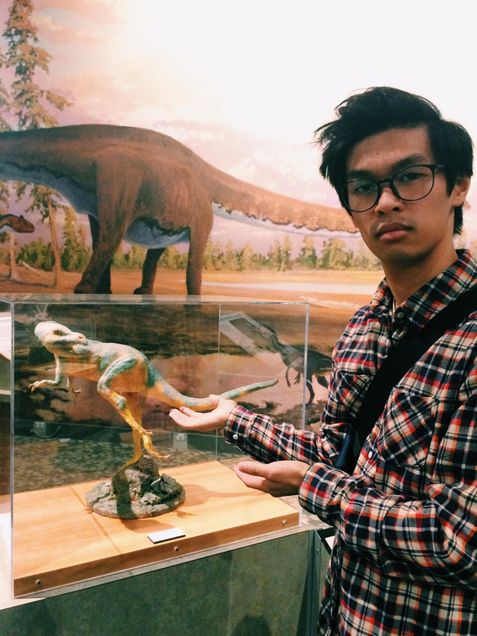 Nick is a Northern California native who got bored of the lack of seasons, moved to the East Coast for college, and decided to stay (not necessarily because of the weather). He enjoy playing and listening to music, fixing things, working with computers, and cracking jokes!
Nick is a Northern California native who got bored of the lack of seasons, moved to the East Coast for college, and decided to stay (not necessarily because of the weather). He enjoy playing and listening to music, fixing things, working with computers, and cracking jokes!
“I’ve always wondered how things worked, so science seemed like a good way to go about figuring that out. When I was in high school, I was taking physics for the first time and my physics teacher didn’t think it was important to interact with students during class time and instead believed that assigning textbook chapters to read and problem sets to solve would be enough. This lack of instruction frustrated and motivated me to teach the material to myself and to my classmates. After that, I helped start a after-school peer-tutoring center where I served as manager and head physics tutor. I joined a similar program while I was an undergraduate at Brown University, tutoring local public high school students in an introductory physics class. After graduating and before enrolling at BU, I served as a City Year AmeriCorps member in a public middle school in south Boston, tutoring students in an 8th grade algebra class. Throughout all of this, I have seen how important an engaging and helpful teacher is and hope to become such a teacher who can motivate students through sparking curiosity rather than garnering frustration.”
“BU has a strong partnership with and offered excellent opportunities to City Year members, so it was only natural that I would apply to this program in order to achieve my goal of becoming a physics teacher. The nature of this program also was very attractive to me, especially the level of support they provide for their students and Noyce scholars and the emphasis the school places on not only learning the concepts and practices necessary for teaching science, but also the nature of science itself and how that applies to one’s teaching practice.”
Melissa Kaufman — Physics
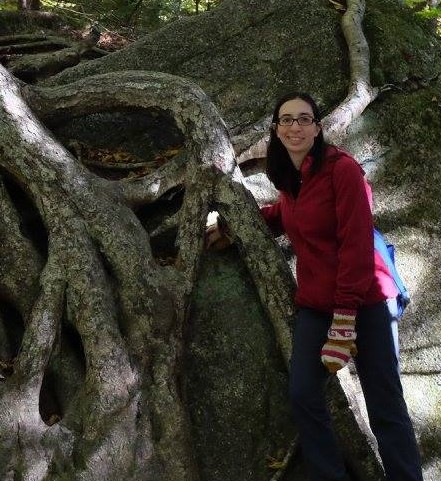 Melissa grew up in Framingham, MA and earned a BS in mechanical engineering in 2010 from MIT. In a stroke of insanity, she received a MS in physical oceanography in 2012 from URI. She spent three years designing computer models of hurricanes for insurance companies before realizing she was unhappy in a cubicle behind a computer all day. She has extensive outreach experience through the MIT Museum, the Educational Studies Program at MIT, the Society of Women Engineers at MIT, Beacon Academy, and private tutoring. She found these experiences very rewarding and has decided to transition to teaching full time!
Melissa grew up in Framingham, MA and earned a BS in mechanical engineering in 2010 from MIT. In a stroke of insanity, she received a MS in physical oceanography in 2012 from URI. She spent three years designing computer models of hurricanes for insurance companies before realizing she was unhappy in a cubicle behind a computer all day. She has extensive outreach experience through the MIT Museum, the Educational Studies Program at MIT, the Society of Women Engineers at MIT, Beacon Academy, and private tutoring. She found these experiences very rewarding and has decided to transition to teaching full time!
“I hated science in middle school. My grandfather, a civil engineer, was distraught about this, so he used to give me “current events” articles about new scientific/engineering/technology discoveries and innovations and inventions. These piqued my interest, so that by high school I was hooked! Having great mentors teachers in high school and college, and a strong support system of friends and family helped maintain my enthusiasm. There is so much out there to discovery, explore, and invent!”
“I chose to attend BU’s MAT program in science education because I was awed by the strong background in both science and education. I also was impressed by the focus on practical skills and not just theory. BU’s participation in PhysTec, and its commitment to strong science educators was a deciding factor.”
Shereen Velupillai — Physics
 Shereen Velupillai was born and raised in New York City. She graduated from Wheaton College (MA) with a concentration in physics and is a proud Posse Alum. She is active in working toward more social justice in science teaching and loves music.
Shereen Velupillai was born and raised in New York City. She graduated from Wheaton College (MA) with a concentration in physics and is a proud Posse Alum. She is active in working toward more social justice in science teaching and loves music.
“I wanted to challenge myself in college. Going to a technical high school (Brooklyn Tech) made me interested in engineering in college. Because I went to a liberal arts school, physics was the closest option.”
“Going to a PWI, I started exploring what it meant to be a woman of color in STEM. I developed a passion for social justice issues and wanted to see more students of color from urban areas pursue STEM degrees. Having so many shared experiences with the students I have worked with, I hope I can inspire more students of color to look at physics as something tangible to them. Going to BU has affirmed the need for teachers of color and I hope to contribute to recruiting more teachers of color in STEM.”
Clark Whitney — Chemistry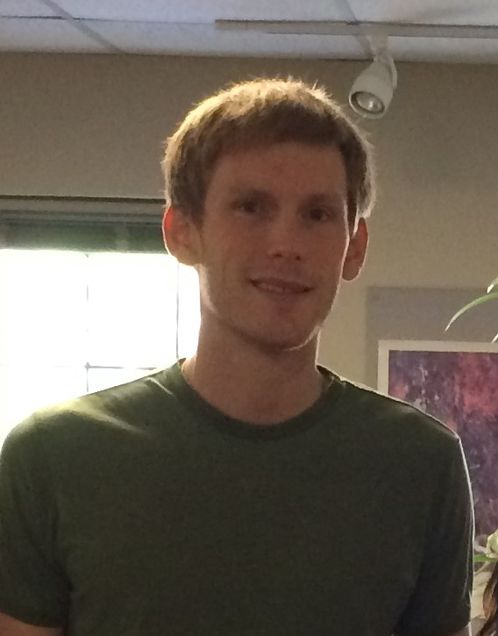
Project BoNUSS Cohort 3 (2015–16)
Alena Houghton — General Science
Rita Cote — Biology
Josh Karlowicz — Physics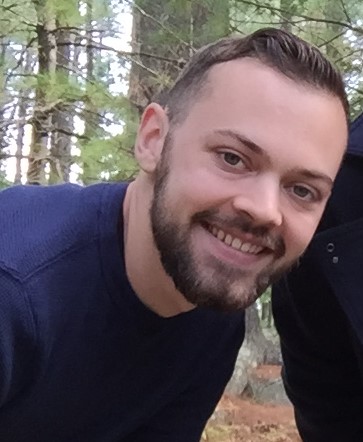
Grace Noble — Biology
Daniela Rios — Biology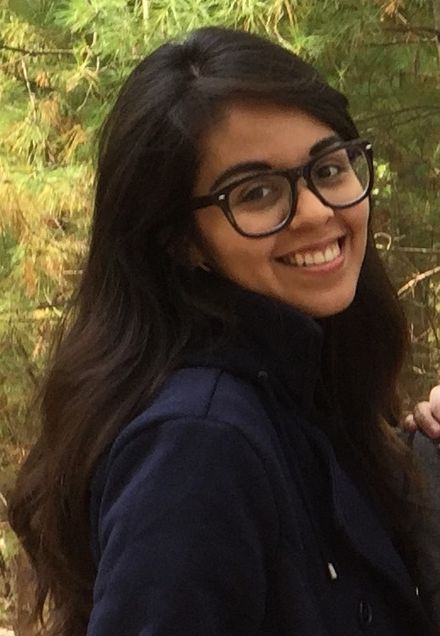
Emily Schmidt — Chemistry
Andrew Sturm — Physics
Roni Teich — Physics
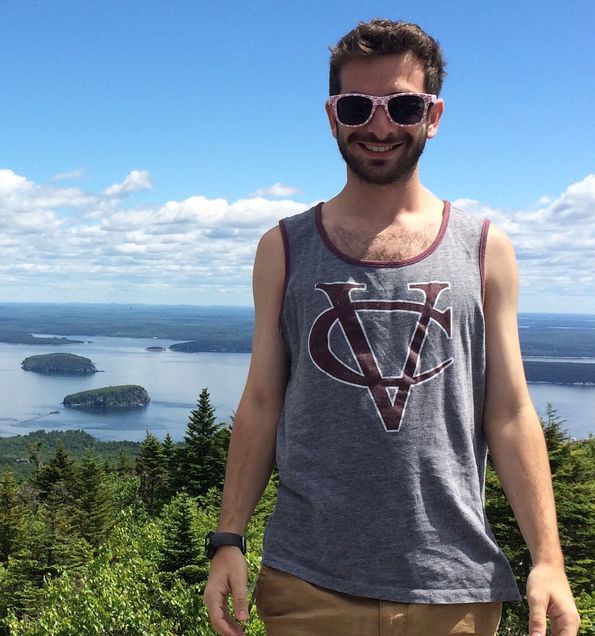 Roni is an astronomy buff, distance runner, Harry Potter nerd, science enthusiast, social justice warrior, and short Jewish guy.
Roni is an astronomy buff, distance runner, Harry Potter nerd, science enthusiast, social justice warrior, and short Jewish guy.
“Astronomy is cool! And science is a very powerful way of seeing, changing, and interacting with the world.”
“BU has a great reputation for education, and is my mom’s (undergraduate) alma mater. After doing astrophysics research for some time and leaning more and more towards the education world, I felt it would be very helpful to earn a master’s degree in teaching while living in a lively, young-people-friendly city. I also wanted to work in a public school, and the MAT program provided me with the licensure path and a great scholarship package.”
Project BoNUSS Cohort 2 (2014–15)
Marina Bush — General Science
Corey Cameron — General Science
Michael Chernicoff — Physics
Jacki Coffey — Biology
Sara Gomez — Biology
Julie Hammond — Physics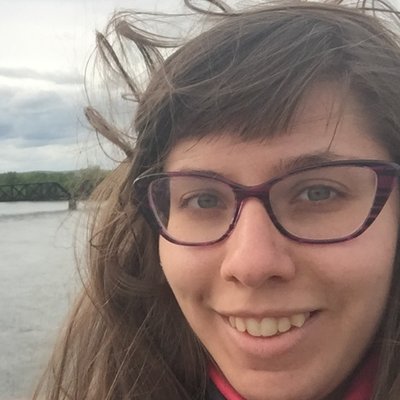
Caitlin Studdard — Physics
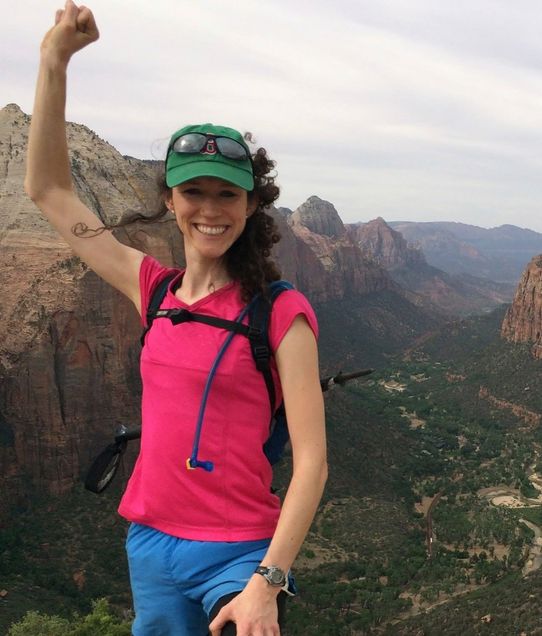 Caitlin is a former energy consultant/engineer who now teaches physics at Waltham High School. A proud Dartmouth alumna, she is an avid outdoorswoman who loves hiking, camping, biking, skiing, and basically anything else outdoors… even shoveling snow! She also enjoy cooking, making/appreciating music, and going on adventures big and small with her wonderful husband and friends.
Caitlin is a former energy consultant/engineer who now teaches physics at Waltham High School. A proud Dartmouth alumna, she is an avid outdoorswoman who loves hiking, camping, biking, skiing, and basically anything else outdoors… even shoveling snow! She also enjoy cooking, making/appreciating music, and going on adventures big and small with her wonderful husband and friends.
“My all-time hero (a.k.a. my high school physics teacher, Mr. Dalby, who remains one of my very best friends to this day despite the fact that I still refuse to address him by his first name) opened my eyes to how beautiful science could be. I found the explanatory power of physics in particular to be breathtaking and thrilling, all because he made it so. Also, as a graduate of an all-girls high school, I am passionate about making young women more interested in STEM.”
“The sense of community that I experienced during my year at BU (and that I continue to experience today) is unparalleled in my educational and professional experience. I am constantly grateful for the family of MATs and professors that came together not only to support one another, but to make our year together full of adventures!”
Chris Windle — Physics
Chris loves all things math and science and tries to convey the awesomeness of each to others.
“The more I read about physics, the more I knew that’s what I wanted to study. How can one live their life without trying to understand the universe they are a part of?”
“I chose BU because it’s a great school, with great educators, and great people.”
Project BoNUSS Cohort 1 (2013–14)

Billy, Ali, Michael, Amy, Jessica, Rachel, Jeff, Elaine, and Karl showing us how they feel about the Noyce program.
Amy Collison — Chemistry
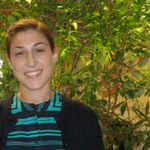 Amy graduated from Holy Cross in 2008 with a Bachelors degree in chemistry. For the next three years, she worked as a research assistant at a start-up biotech company, where her research focused on organic synthesis and cell biology. She continued to pursue research in cell biology at Boston Children’s Hospital in the Department of Hematology/Oncology. While at the Hospital, she also had the opportunity to volunteer each week. Through her interactions with the patients, Amy realized how much she enjoyed working with kids. This experience is what ultimately prompted her to become a teacher
Amy graduated from Holy Cross in 2008 with a Bachelors degree in chemistry. For the next three years, she worked as a research assistant at a start-up biotech company, where her research focused on organic synthesis and cell biology. She continued to pursue research in cell biology at Boston Children’s Hospital in the Department of Hematology/Oncology. While at the Hospital, she also had the opportunity to volunteer each week. Through her interactions with the patients, Amy realized how much she enjoyed working with kids. This experience is what ultimately prompted her to become a teacher
“While I enjoyed my time in the laboratory, some of my favorite moments at the Hospital were working as a volunteer. Through my volunteer work, I discovered the joys of working directly with children and my desire to guide and support them as a teacher. I believe that my scientific career will largely influence my teaching strategies. As a teacher, I hope to draw upon my experiences in lab as a way to discuss chemistry in a familiar and relevant manner. I hope that this will help my students to imagine occupations they had not yet considered, giving them the confidence to set new, challenging goals.”
“I chose Boston University’s M.A.T. program because I could see through their curriculum that I would develop concrete teaching strategies that would allow me to merge my scientific and teaching careers. As a BU student, I greatly appreciate the supportive environment at SED and its clear commitment to science education in urban schools.”
William Decker — Chemistry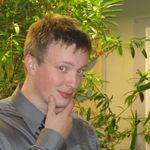
Jeffrey Fox — Physics
 Jeffrey is from Freehold, New Jersey (aka the hometown of Bruce Springsteen). He is in the dual-degree program and will graduate with degrees in physics and education in May 2014. Jeff has been a student leader since coming to Boston University, including three years as a Dean’s Host and he is co-president this year.
Jeffrey is from Freehold, New Jersey (aka the hometown of Bruce Springsteen). He is in the dual-degree program and will graduate with degrees in physics and education in May 2014. Jeff has been a student leader since coming to Boston University, including three years as a Dean’s Host and he is co-president this year.
Be sure to read Jeff’s BU Culture Shock blog.
“I have known years that I wanted to teach. However, I did not know right away what subject that I wanted to teach. For several years, including while I was applying to colleges, I was convinced that I was going to be an English teacher, but I decided that I wanted to do into physics based on that one lesson on the de Broglie wavelength—I’m still rather entranced by the fact that I am a wave! I have always enjoyed science, but the sciences became an even larger part of my life after I arrived at Boston University.”
“I came to Boston University in part because I knew there would be other people here who share this goal. I am consistently impressed with both my mentors and peers at the School of Education, and I know that I will be the best teacher that I can be because of the training that I have received here. I think that education is the most good that I can do with my life, and our world needs excellent teachers, especially in science, more than anything else. ”
Michael Friedman — Physics
 Michael received a bachelors degree in mathematics and physics from Oberlin College. He came to Boston University in 2010 to study physics and began research in nanobiotechnology with aspirations of making a positive difference in the world through scientific research and teaching undergraduate level physics. While in the physics department, Michael was a fellow with the GK–12 program, an NSF-funded program partnering graduate students and teachers in K-12 classrooms to enhance their curriculum, and he interned at an urban Boston public school.
Michael received a bachelors degree in mathematics and physics from Oberlin College. He came to Boston University in 2010 to study physics and began research in nanobiotechnology with aspirations of making a positive difference in the world through scientific research and teaching undergraduate level physics. While in the physics department, Michael was a fellow with the GK–12 program, an NSF-funded program partnering graduate students and teachers in K-12 classrooms to enhance their curriculum, and he interned at an urban Boston public school.
“At Oberlin College, my career path was still uncertain. My idols were my college professors, and I was enjoying research in hydrogen technology—which had exciting applications for future fuel cell cars. The GK–12 program program changed my outlook on how I could best spend my energy changing lives for the better. Though I was fascinated by my research in biosensing, nanotechnology, and early detection of disease, I discovered that the life of a scientist was simply not for me.”
“After three years, I made the difficult decision to leave the physics program and laboratory that I adored so much to follow what I believe to be my passion and enroll at the BU School of Education. As I continue on this path towards being an educator, I plan to maintain my connections with the physics and engineering departments at Boston University, utilizing those resources and my expertise in physics to be an excellent teacher of science.”
Rachel Norris — Biology
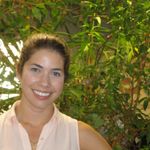 Rachel hails from Little Rock, Arkansas and jumped at the opportunity to attend Boston University and be part of the Master of Arts in Teaching Science Program. She received her degree in Biology, Magna Cum Laude, from the University of Arkansas Little Rock with every intention of attending medical school and gained a great deal of insight working for two years in clinics and an Emergency Room. While Rachel found scientific study fascinating, her focus began to shift from entering into the medical field towards giving back to her community. She worked for City Year Little Rock/North Little Rock, an AmeriCorps educational non-profit as a corps member in a middle school and a team leader at an elementary school. It was during those two incredible years when Rachel realized that her heart belonged in a school and that she wanted to teach the aesthetics of science and the beauty in the world around us.
Rachel hails from Little Rock, Arkansas and jumped at the opportunity to attend Boston University and be part of the Master of Arts in Teaching Science Program. She received her degree in Biology, Magna Cum Laude, from the University of Arkansas Little Rock with every intention of attending medical school and gained a great deal of insight working for two years in clinics and an Emergency Room. While Rachel found scientific study fascinating, her focus began to shift from entering into the medical field towards giving back to her community. She worked for City Year Little Rock/North Little Rock, an AmeriCorps educational non-profit as a corps member in a middle school and a team leader at an elementary school. It was during those two incredible years when Rachel realized that her heart belonged in a school and that she wanted to teach the aesthetics of science and the beauty in the world around us.
“When looking at graduate programs, the MAT Science Education Program at Boston University spoke to me on many different levels and I knew it would give me the innovative instruction I would need to empower students to learn. I was attracted to the program’s dedication in developing and practicing ways to teach students through active science. When I accepted my offer to Boston University, I believed I would receive outstanding instruction on current equitable science education theory and ideas on powerful innovative constructivist content while simultaneously gaining experience as a student teacher.”
“I have told multiple friends and family members that since my first day of classes, I knew I had made the correct decision and that I had already begun to gain the knowledge and have the experiences promised by the MAT program. I am very excited for my future and the teacher I will become because of my education at Boston University.”
Elaine Richardson — General Science
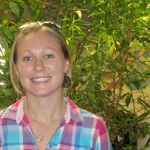 Elaine grew up in Westwood, Massachusetts, a suburb of Boston, and received a bachelors in Environmental Science from the University of Massachusetts Amherst in 2008. Wanting to positively impact the world, she planned to pursue a career in environmental policy following a life-long interest in the natural environment. Elaine was hired as an outdoor educator at Nature’s Classroom, a non-profit experiential education program for middle school students in New England and knew almost immediately that she wanted to teach. After working as an instructor for the program for two and a half years and as a site coordinator for two more, Elaine knew it was time to translate her outdoor education skills and experience into a public school classroom.
Elaine grew up in Westwood, Massachusetts, a suburb of Boston, and received a bachelors in Environmental Science from the University of Massachusetts Amherst in 2008. Wanting to positively impact the world, she planned to pursue a career in environmental policy following a life-long interest in the natural environment. Elaine was hired as an outdoor educator at Nature’s Classroom, a non-profit experiential education program for middle school students in New England and knew almost immediately that she wanted to teach. After working as an instructor for the program for two and a half years and as a site coordinator for two more, Elaine knew it was time to translate her outdoor education skills and experience into a public school classroom.
“I am very excited to be a part of the Noyce program at Boston University, and chose the MAT Science Education program at BU because I was impressed by everyone I met and spoke with and I knew it would be an opportunity to be a part of a top notch learning community. The program has far surpassed my expectations! Along with excellent in-class instruction, I have had the opportunity to get hands-on teaching experience with interesting, diverse groups of students in several different contexts. I know that when I graduate from BU in May I will be well prepared to be an enthusiastic and effective middle school science teacher!”
“I decided to alter my career path after college because I realized that the way I wished to change the world was to teach others to be inquisitive, thoughtful “scientists” and inspire them to pursue their passions in school and beyond. I had the privilege of receiving an excellent public school education and I want to bring the same caliber of instruction and passion that many of my teachers possessed to urban schools in Massachusetts. I plan to spend my career teaching in urban, high-need schools because I believe that inspired and inspiring teachers have the potential to reach high-risk students in high-need areas. My coursework and practicum experiences through BU are helping me solidify that belief.”
Alice Shaw — General Science
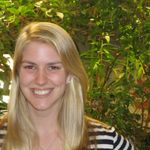 Ali graduated from the University of Virginia in 2012, receiving a B.A. in both Environmental Sciences and Spanish. Following graduation, she worked as an environmental educator at the University of Rhode Island’s W. Alton Jones Campus and then at the Audubon Society of Rhode Island through the Ocean State Environmental Education Collaborative (OSEEC) AmeriCorps program. One of the chief goals of OSEEC is to improve the science proficiency and environmental literacy of students in Rhode Island’s urban areas., and while Ali worked with students from many different types of schools during my service year, she found time spent in urban schools to be the most rewarding.
Ali graduated from the University of Virginia in 2012, receiving a B.A. in both Environmental Sciences and Spanish. Following graduation, she worked as an environmental educator at the University of Rhode Island’s W. Alton Jones Campus and then at the Audubon Society of Rhode Island through the Ocean State Environmental Education Collaborative (OSEEC) AmeriCorps program. One of the chief goals of OSEEC is to improve the science proficiency and environmental literacy of students in Rhode Island’s urban areas., and while Ali worked with students from many different types of schools during my service year, she found time spent in urban schools to be the most rewarding.
“In eighth grade, I had an incredible science teacher. It was not the content of her course, however, that made her so remarkable; it was her approach. Everything was hands-on: we dissected squids, performed egg drops, and more. She also headed NASA’s EarthKAM program at our school, in which we were able to take photos of the Earth from the International Space Station. She pushed her students to reach for the stars, figuratively and literally, and opened my eyes up to the wonders of science. Two years later my biology teacher took my love of science and gave it a focus: the environment. Despite rigid learning assessment requirements, he focused the course on what he thought was most important: ecology lessons and outdoor excursions. He encouraged his students to take the time to notice nature, and strove to instill an appreciation for the great outdoors within all of us. Just like any classroom, there were posters around the room, but a special one hung on the door. It was a picture of the Earth with this Kenyan proverb written across it: ‘Treat the Earth well, it was not given to you by your parents, it was loaned to you by your children.’ To this day I try to live in accordance with this quote, and also incorporate this maxim into my teaching.”
“I chose Boston University’s School of Education for several reasons. Not only is it a great school, but also has top-notch professors who truly care about their students. Thanks to the flexibility and support of the Science MAT faculty, I was able to complete my AmeriCorps year of service in Rhode Island while also beginning the MAT program with the other members of my class. Finally, Boston is a great city and I was excited about the opportunities to work with students in the Greater Boston Area. So far I have really enjoyed and learned a lot from both my courses and pre-practicum, and I am glad that I chose SED.”
Jessica Sullivan — Biology
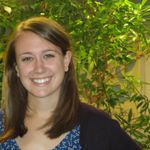 Jessica graduated from BU in 2011 with a Bachelors degree in Biology, and for the next two years worked in a Developmental and Regenerative Biology research lab at the Joslin Diabetes Center in Boston studying hematopoietic stem cells. While volunteering with inner-city students at a summer science camp as an undergraduate, it became clear to Jessica how important it was for her to find opportunities to share her knowledge and excitement for biology with others.
Jessica graduated from BU in 2011 with a Bachelors degree in Biology, and for the next two years worked in a Developmental and Regenerative Biology research lab at the Joslin Diabetes Center in Boston studying hematopoietic stem cells. While volunteering with inner-city students at a summer science camp as an undergraduate, it became clear to Jessica how important it was for her to find opportunities to share her knowledge and excitement for biology with others.
“Working at Joslin was invaluable in terms of gaining experience in the field and strengthening my understanding of content, it was also an awakening personal experience. I realized that instead of spending my time in the lab all day, I would much rather spend my time in the classroom, working with students to strengthen their knowledge and form a positive opinion of science. This is an important mission, especially today, where there seems to be a growing divide between those inside and outside of the science community. I want to work to change this by helping to inspire the next generation of scientists, in the hopes of strengthening communication within the science community. I feel it is the job of scientists to be the ones working to bridge these gaps, and that the first step is working with students in our schools, especially the schools with historically less access to resources and science educators.”
“As a former BU student, I of course was biased in making my decision to enroll in the MAT program here at BU. In my opinion, the university is unmatched in terms of its available resources, faculty, and commitment to student success. (Its location within the city of Boston is also an added bonus…) The positive experiences I had as an undergraduate have completely translated to my graduate experience thus far. Both the Noyce Science program and SED as a whole are close communities in which help and support are always readily available, which for me has already proven to be a valuable resource, and most likely will only be more so as the program progresses.”
Karl Yando — Physics
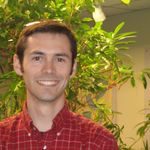 Karl was raised in southeastern Massachusetts, and from a young age, has been interested in how the world works. This interest led him to science and the study of physics, which promises the ability to help us see and understand the universe in new ways. Karl earned BA and MS degrees in physics from Dartmouth College. Most recently, he was employed at Space Sciences Laboratory at the University of California, Berkeley. He enjoys hiking, the outdoors, and DIY projects and repairs.
Karl was raised in southeastern Massachusetts, and from a young age, has been interested in how the world works. This interest led him to science and the study of physics, which promises the ability to help us see and understand the universe in new ways. Karl earned BA and MS degrees in physics from Dartmouth College. Most recently, he was employed at Space Sciences Laboratory at the University of California, Berkeley. He enjoys hiking, the outdoors, and DIY projects and repairs.
Near the end of his undergraduate career, Karl discovered a latent interest in teaching and education. From this point, his direction was clear: he would share his passion for science with others as an educator. Nevertheless, Karl’s path to Boston University’s School of Education proved anything but direct, and included graduate study in physics, two trips to Antarctica, and several years’ research in the realm of space plasma physics. During this time, Karl’s experiences as a teaching assistant, science camp instructor, and GK–12 fellow (involved with outreach teaching in local schools) served to reinforce his conviction that the science classroom was where he belonged.
“In particular, I believe in the importance and necessity of a strong system for public education (my own upbringing K–12). Through its long history of partnerships with many Boston-area school districts, BU’s School of Education has demonstrated a commitment to advocating for universal and equitable educational access for all students. This was a community I wanted to be a part of!”







